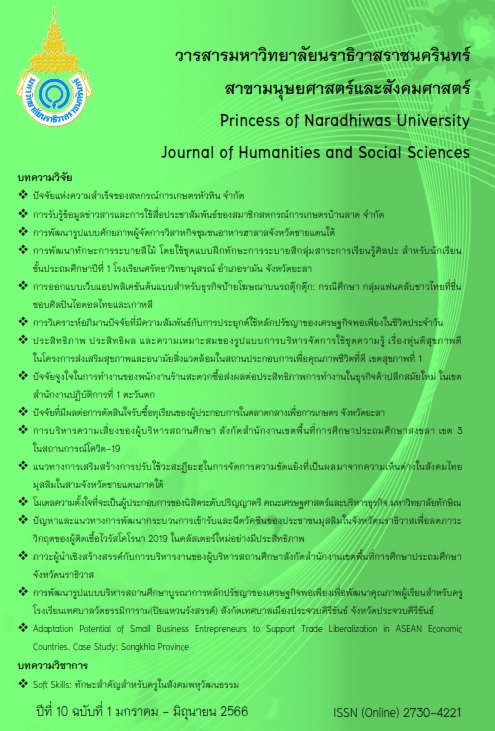การวิเคราะห์อภิมานปัจจัยที่มีความสัมพันธ์กับการประยุกต์ใช้หลักปรัชญาของเศรษฐกิจพอเพียงในชีวิตประจำวัน
Main Article Content
บทคัดย่อ
การวิเคราะห์อภิมานงานวิจัยครั้งนี้มีวัตถุประสงค์เพื่อสำรวจคุณลักษณะงานวิจัย เปรียบเทียบความแตกต่างของคุณลักษณะงานวิจัย และวิเคราะห์หาค่าดัชนีมาตรฐานของปัจจัยที่มีความสัมพันธ์กับการประยุกต์ใช้หลักปรัชญาของเศรษฐกิจพอเพียงในชีวิตประจำวัน ประชากร คือ งานวิจัย เชิงปริมาณที่ศึกษาเปรียบเทียบหรือวิเคราะห์ความสัมพันธ์ระหว่างตัวแปร ตั้งแต่ปี พ.ศ.2555 ถึง พ.ศ.2564 จำนวน 73 เรื่อง เครื่องมือที่ใช้ในการวิจัย ได้แก่ แบบประเมินคุณภาพงานวิจัย และแบบสรุปคุณลักษณะงานวิจัย ผ่านการตรวจสอบคุณภาพความตรงตามเนื้อหาจากผู้เชี่ยวชาญ จำนวน 3 ท่าน นำข้อมูลทั้งหมดมาคำนวณด้วยวิธีการของโรเซนทาล และเฮดเจส ได้ค่าดัชนีมาตรฐาน จำนวน 233 ค่า และวิเคราะห์ข้อมูลโดยใช้โปรแกรม Jamovi โปรแกรมเสริม MAJOR-Meta-Analysis for JAMOVI และโปรแกรม R ผลการศึกษา พบว่า คุณลักษณะงานวิจัยประกอบด้วย 3 ด้าน ได้แก่ ด้านคุณลักษณะทั่วไป ด้านเนื้อหาสาระของงานวิจัย และด้านวิธีวิทยาการวิจัย โดยพบว่าคุณลักษณะงานวิจัยไม่ส่งผลให้เกิดความแตกต่างของค่าดัชนีมาตรฐาน ผลการวิเคราะห์อภิมาน พบว่า ปัจจัยที่มีความสัมพันธ์ เชิงบวกกับการประยุกต์ใช้หลักปรัชญาของเศรษฐกิจพอเพียงในชีวิตประจำวัน ได้แก่ ปัจจัยด้าน จิตลักษณะตามสถานการณ์ (r=.52, p<.001) รองลงมาคือปัจจัยด้านสถานการณ์ (r=.36, p<.001) ปัจจัยด้านจิตลักษณะ (r=.21, p<.001) และปัจจัยด้านลักษณะทางชีวสังคมและภูมิหลัง (r=.11, p< .001) ตามลำดับ
Article Details

อนุญาตภายใต้เงื่อนไข Creative Commons Attribution-NonCommercial-NoDerivatives 4.0 International License.
เอกสารอ้างอิง
กฤษฎา หลักเมือง. (2559). วิถีชีวิตตามแนวปรัชญาของเศรษฐกิจพอเพียงของชาวนาในจังหวัด สงขลา (วิทยานิพนธ์ปริญญามหาบัณฑิต). มหาวิทยาลัยสงขลานครินทร์, สงขลา.
โกศล สอดส่อง. (2564). การประยุกต์ใช้ปรัชญาเศรษฐกิจพอเพียงในชีวิตประจำวันของประชาชน ตำบลสำเภาล่ม อำเภอพระนครศรีอยุธยา จังหวัดพระนครศรีอยุธยา. วารสารพุทธมัคค์ศูนย์วิจัยธรรมศึกษา สำนักเรียนวัดอาวุธวิกสิตาราม, 6(2), 189-198.
คณะกรรมการโครงการเฉลิมพระเกียรติของสภานิติบัญญัติแห่งชาติ. (2560). ศาสตร์ของ พระราชา : ผู้นำโลกในการพัฒนาอย่างยั่งยืน. กรุงเทพฯ: อมรินทร์พริ้นติ้งแอนด์พับลิชชิ่ง.
ดาวเรือง พัฒนวิบูลย์. (2561). การพัฒนาการดำเนินชีวิตตามหลักปรัชญาของเศรษฐกิจพอเพียงของเกษตรกรในอำเภอสุวรรณภูมิ จังหวัดร้อยเอ็ด (วิทยานิพนธ์ปริญญาดุษฎีบัณฑิต).มหาวิทยาลัยราชภัฏมหาสารคาม, มหาสารคาม.
ดุจเดือน พันธุมนาวิน. (2560). สี่ทศวรรษของการขับเคลื่อนหลักปรัชญาของเศรษฐกิจพอเพียงในสาขาจิตพฤติกรรมศาสตร์. วารสารพัฒนาสังคม, 19(1), 21-21.
นักสิทธ์ ศักดาพัฒน์. (2564). การวิจัยจิตพฤติกรรมศาสตร์กับรูปแบบปฏิสัมพันธ์นิยม. วารสารวิทยาลัยดุสิตธานี, 15(1), 529-546.
นิภาพรรณ เจนสันติกุล. (2562). ปรัชญาเศรษฐกิจพอเพียง : การสำรวจงานวิจัยระหว่าง พ.ศ.2549-2558. วารสารวิชาการเซาธ์อีสท์บางกอก (สาขามนุษยศาสตร์และสังคมศาสตร์), 5(1), 1-11.
ปทิตตา ใจดี. (2562). พฤติกรรมการดำเนินชีวิตตามปรัชญาของเศรษฐกิจพอเพียงสำหรับเจ้าหน้าที่สังกัดกองมหาดเล็ก สำนักพระราชวัง (วิทยานิพนธ์ปริญญามหาบัณฑิต). มหาวิทยาลัยราชภัฏเพชรบุรี, เพชรบุรี.
ปรีชา ปาโนรัมย์. (2560). การวิเคราะห์ปรัชญาเศรษฐกิจพอเพียงและการประยุกต์ใช้จาก ผลงานวิจัย. วารสารสหวิทยาการจัดการ มหาวิทยาลัยราชภัฏบุรีรัมย์, 1(1), 43-56.
ผ่องศรี พัฒนมณี. (2560). รายงานการวิจัยเรื่องปัจจัยที่สัมพันธ์กับพฤติกรรมการดำเนินชีวิตตามปรัชญาเศรษฐกิจพอเพียงของประชาชนบ้านไสต้นวา ตำบลบ่อหิน อำเภอสิเกา จังหวัดตรัง. ตรัง: มหาวิทยาลัยเทคโนโลยีราชมงคลศรีวิชัย.
พีรญา เชตุพงษ์, พรประภา แสงสินเจริญชัย, บุญเรียม ทะไกรราช, และณัฐชา ธำรงโชติ. (2563). รายงานการวิจัยเรื่องการใช้หลักปรัชญาเศรษฐกิจพอเพียงในการดำเนินชีวิตของผู้มีงานทำ ในกรุงเทพมหานคร. กรุงเทพฯ: มหาวิทยาลัยเทคโนโลยีราชมงคลพระนคร.
มัทนียา มูลศรีแก้ว, และทัศน์ศิรินทร์ สว่างบุญ. (2563). การสังเคราะห์งานวิจัยเกี่ยวกับการจัดการเรียนการสอนตามแนวคิดหลักปรัชญาของเศรษฐกิจพอเพียงด้วยการวิเคราะห์อภิมาน. วารสารการวัดผลการศึกษา, 37(101), 171-185.
ศิริลักษณ์ ศุกระเศรณี, และไชยยศ ไพวิทยศิริธรรม. (2563). การวิเคราะห์อภิมานการประยุกต์ใช้หลักปรัชญาของเศรษฐกิจพอเพียงในการจัดการเรียนรู้ในระดับการศึกษาขั้นพื้นฐาน. วารสารศิลปากรศึกษาศาสตร์วิจัย, 12(2), 237-255.
สาลี สิริโพคา. (2561). การมีส่วนร่วมของประชาชนตามหลักปรัชญาของเศรษฐกิจพอเพียงที่มีผลต่อการพัฒนาคุณภาพชีวิตประชาชนในแขวงจำปาสักสาธารณรัฐประชาธิปไตยประชาชนลาว. วารสารวิชาการมหาวิทยาลัยการจัดการและเทคโนโลยีอีสเทิร์น, 15(1), 163-172.
สุชีรา ธนาวุฒิ, บรรพต วิรุณราช, และลลิต ถนอมสิงห์. (2560). การสังเคราะห์องค์ประกอบปรัชญาของเศรษฐกิจพอเพียงไปปฏิบัติจริงในการพัฒนาธุรกิจ. วารสารวิทยาลัย พาณิชยศาสตร์บูรพาปริทัศน์, 12(1), 45-62.
สุธินี อัตถากร, และสุบรรณ เอี่ยมวิจารณ์. (2564). การพัฒนาพฤติกรรมในการดำรงชีวิตตาม ปรัชญาของเศรษฐกิจพอเพียงของผู้นำชุมชนในระดับหมู่บ้าน ในจังหวัดมหาสารคาม.วารสารสถาบันวิจัยและพัฒนา มหาวิทยาลัยราชภัฏมหาสารคาม, 8(1), 251-266.
อุทัยวรรณ เพ็งธรรม. (2560). ความสัมพันธ์ระหว่างการปฏิบัติตามหลักปรัชญาเศรษฐกิจพอเพียงกับคุณภาพชีวิตของเกษตรกรที่ขึ้นทะเบียนเกษตรกรในเขตอำเภอเมืองชลบุรี จังหวัดชลบุรี(วิทยานิพนธ์ปริญญามหาบัณฑิต). มหาวิทยาลัยบูรพา, ชลบุรี.
Cooper, H., Hedges, L.V., & Valentine, J. C. (2019). The handbook of research synthesis andmeta-analysis (3rd ed.). New York, NY: Russell Sage Foundation.
Hamilton, W. K. (2020). MAJOR-Meta-Analysis for JAMOVI. GitHub.
Matthay, E. C., Hagan, E., Gottlieb, L. M., Tan, M. L., Vlahov, D., Adler, N., & Glymour, M. M. (2021). Powering population health research: Considerations for plausible and actionable effect sizes. SSM - Population Health, 14, 1-9.
Paul, J., & Barari, M. (2022). Meta-analysis and traditional systematic literature reviews-What, why, when, where, and how? Psychology & Marketing, 39, 1099–1115.
R Core Team. (2021). R: A language and environment for statistical computing (Version 4.0) [Computer software]. https://cran.r-project.org
The jamovi project. (2022). Jamovi (Version 2.2) [Computer Software]. https://www.jamovi.org
Wilson, D. B. (2017). Formulas used by the “practical meta-analysis effect size calculator”.Virginia, VA: George Mason University.
Wilson, D. B. (2001). Effect size determination program (Version 2.0) [Excel Macro Application]. University of Maryland.
Wilson, D. B. (n.d.). Practical meta-analysis effect size calculator [Computer software]. https:// cam pbellcollaboration.org/research-resources/effect-size-calculator.html


